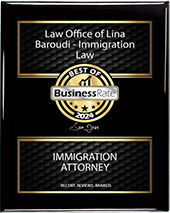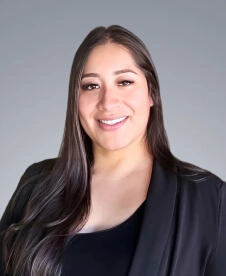“Declined” is the last thing you want to hear when making a request or application. But while a declined credit card is a little embarrassing, a declined immigration visa application is life-changing.
The USCIS may deny entry to the United States for a variety of questionable reasons – from alleging someone poses a threat to national security to accusing applicants of fraud or using minor health issues as an excuse. A declined visa halts dreams and leaves applicants in limbo, especially if the denial seems unfounded.
But while being deemed inadmissible by authorities is never a welcome outcome, it doesn’t have to be the end of the line for your immigration journey.
With help from our experienced immigration lawyers, you can file a Form I-601 or Form I-601A waiver of grounds of inadmissibility. Our attorneys at The Law Office of Lina Baroudi in San Jose know which documents to present and how to present them, as well as what arguments to make on your behalf.
When to Use Form I-601 or Form I-601A Waiver
People file Form I-601 and Form I-601A waiver requests if they are applying for certain kinds of immigrant visas or adjustment of status, and are subject to a ground of inadmissibility. For either waiver, you must show that your U.S. citizen or green card holder spouse or children will suffer extreme hardship if you are not allowed to immigrate to the U.S.
Form I-601
Form I-601 is for individuals applying from within or outside of the U.S. It allows them to request a waiver for certain grounds of inadmissibility for select visa categories. For example, waivers can be requested for issues like criminal records, health-related grounds, immigration violations, and misrepresentation.
However, not all grounds for inadmissibility can be waived. It is critical to consult the I-601 instructions to confirm if you qualify for a waiver, given your visa type and reason for denial or inadmissibility. Generally, you may be able to file Form I-601 if you are one of the following:
- Those outside the U.S. seeking immigrant visas — Applicants interviewed and deemed inadmissible by a consular officer abroad can file an I-601 waiver. This includes those seeking family-based, employment-based, or K and V visas.
- Adjustment of status applicants — Many adjusting status within the U.S. may submit I-601 waivers, excluding some categories like asylum and refugees.
- TPS and NACARA applicants — Those seeking Temporary Protected Status or Nicaraguan Adjustment and Central American Relief Act (NACARA) benefits can file I-601 waivers.
- VAWA self-petitioners — Applicants for green cards based on the Violence Against Women Act, including children of self-petitioners, may submit I-601 waivers.
- T Nonimmigrant adjustment applicants — Those adjusting status based on T visas for trafficking victims can file I-601 waivers.
- SIJ adjustment applicants — Special Immigrant Juveniles with approved I-360 petitions adjusting status in the U.S. can seek waivers via the I-601.
The I-601 waiver application costs $930 to file. While still expensive, for immigrants facing a lifetime ban from the U.S., the I-601 provides a narrowly open door and a chance to regain access.
Form I-601A
Many immigrants enter the U.S. to be with close family members and overstay any authorized period of time. For a variety of reasons, if they are not eligible to apply for a green card in the U.S., they must leave and apply for an immigrant visa at a U.S. embassy abroad. Departing triggers the three or ten year unlawful presence bar from returning to the U.S.
The I-601A waiver allows immigrants to seek forgiveness from the 3 and 10 year bars. And, the immigrant can file the waiver while still in the U.S., and allows them to stay with their spouses, parents, and children in the U.S. while their waiver application is processed. Once approved, they will need to continue their case overseas at a consulate or embassy.
Generally, to file Form I-601A, you must be:
- Physically present in the U.S.
- At least 17 years old when filing
- Have a pending immigrant visa case with the Department of State meeting certain conditions (see instructions)
To qualify, immigrants must apply from within the U.S. before they leave. Approval allows them to go to their visa interview ban-free. The application fee for a Form I-601A waiver is $630 fee.
How to Apply for an I-601 or I-601A Waiver
Applying for an I-601 Waiver
If a consular officer finds you inadmissible for an immigrant visa or K/V visa when interviewed abroad, you may apply for an I-601 waiver if eligible.
To apply:
- Confirm with the consular officer that you are eligible for a waiver.
- Obtain and complete Form I-601 Submit all required documentation and evidence to demonstrate eligibility.
- Mail the complete application package to the USCIS address listed in the instructions.
- Wait for USCIS processing. This takes 31.5-34 months on average.
If approved, your waiver will be sent to you and the consular officer. If denied, you may appeal or seek reconsideration.
If you are applying for adjustment of status in the U.S., you may file your I-601 waiver application at the same time as you file your green card application. It is highly advisable to consult with an immigration attorney before proceeding.
Applying for an I-601A Waiver
If you reside in the U.S. and need to consular process abroad for a green card, you may apply for an I-601A waiver in advance.
To apply:
- Confirm you meet all eligibility requirements listed in the I-601A instructions.
- Collect documentation and evidence to show extreme hardship for a qualifying relative if denied.
- Complete Form I-601A and include all required materials.
- Mail the complete application package to the USCIS address listed in the instructions. Comply with any biometrics or interview requests from USCIS.
- Wait for USCIS processing. This takes 44 months on average.
- If approved, depart for your consular interview with the waiver in hand.
A denial of entry or adjustment of status isn’t the last word in the matter. For a confidential consultation with an experienced San José family immigration lawyer, contact the Law Office of Lina Baroudi today.





















